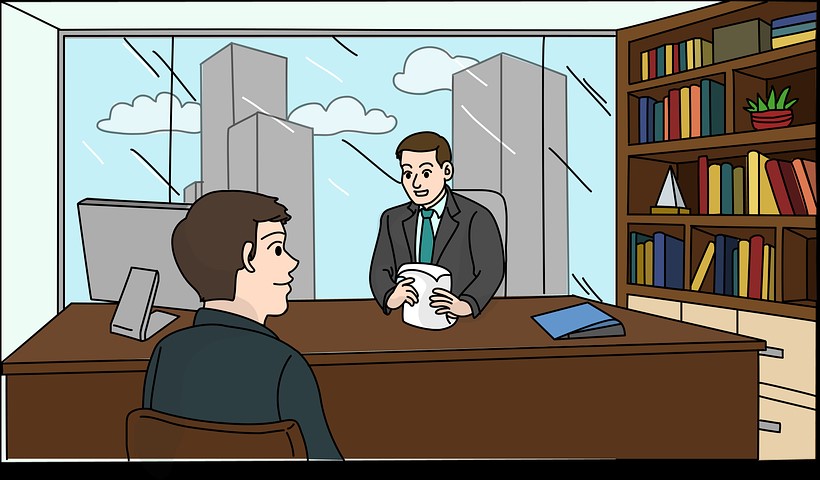During job interviews, employers use various tricks to test potential candidates. And that’s nothing new; and it’s not bad either – it’s completely logical: they want to protect themselves, their company, those employees who have been there for many years and of course, their capital and interests. And no, they don’t see you as an intruder, simply, depending on the results of the „test“, they will see whether you fit into the collective or not.
So what exactly do those“tricks“ or trap questions look like?
1. This question, or rather this procedure, is also called the „coffee test“. They will usually offer you something to drink – coffee, juice, a glass of water. You will probably accept out of courtesy. The test comes only after – when the interview is over and it refers to your reaction (if any): will you ask where to put the cup down? Will you get up with a cup in your hand and ask where is the kitchen to take the cup to the sink? Or will you simply leave it on the table for someone to clean up behind you? People who leave things scattered behind them are generally undesirable in a team. Imagine that each of the 50 or even 100 or more employees leaves glasses, mugs, bags, leftover food, etc. on the tables and other work surfaces. And that he / she then expects „someone“ to clean up after… This detail reveals not only what kind of attitude we have towards things but also towards other people – and specifically, our future colleagues.
2. If in the meantime they left you in the office or corridor to wait – don’t be surprised. This trick is even described in many books and employees in various military and other government services are tested in the same way during the admission procedure. As we all know – waiting is stressful; it becomes even worse if in the meantime they call you for an interview and tell you to go back to the waiting room, then they call you in again and cancel again and so on 2-3 times. Patience and level of resistance to stress are tested, as well as reactions in unpleasant situations (will you leave the interview – which means to give up at the first obstacles / difficulties or maybe you will get angry, shout, insult the person who informs you that you have to wait, etc.).
3. When the interview (finally) starts, one of the common questions is about your former employer: why did you leave that company? Caution! If you say the worst about your former employer and air all their „dirty laundry“, the first thing your future employer will think is that you will do the same to him in case you change jobs again. It is preferable to give diplomatic / general answers, not to present „juicy details“ and not to bring a lot of negative emotions into the interview. Leave complaining and gossiping to family and friends. The employer is not your best friend – he is a person who is looking for an employee who can control his emotions, stays calm and reserved, does not engage in gossip and his demeanor is professional.
4. Speaking of professional conduct, another pitfall relates to professional secrets. Don’t be surprised if they ask you a question about the business you left; specifically, the question can be about products, marketing, prices, clients, new patents, etc. The same rule applies here as under item 3. Business secrets are simply not disclosed. In addition to being unprofessional, it is also illegal. What will your future employer think? In case you get angry or decide to change your workplace again, will you reveal HIS business secrets at other job interviews? Therefore, limit yourself to polite but restrained answers, and in case the employer insists – refer to the law and tell him openly and directly that you are not allowed to talk about it. Say no; no matter how unpleasant it may seem at that moment. Even if you don’t get the job, you’ll earn respect and maybe even get referrals. And a good voice can be heard far away.
Getting a job isn’t the problem, the point is to keep getting the job. Anonymous author
5. Speaking of your old company, most future employers ask seemingly strange questions about possible mutual acquaintances, fairs and congresses you participated in, etc. This phenomenon is also present in the West (and especially in South Europe) and concerns the good old source of information called „word of mouth“. Just as this technique is still the best advertisement for most products today, it is also the best advertisement for people. They will probably ask around and find someone who knows someone who knows you – what are you like as a person, what kind of worker are you, are you a trustworthy person, are you reliable, are you late for work, etc. There is no right or wrong answer here – whether you will be hired depends only on what impression you have made so far and what your behavior has been…
6. The question of all questions: at the end of every interview, the prospective employer usually asks the candidate if he has any questions. And most of them humbly and sheepishly answer that there is none… And that’s the end of it. A question about questions is one big test-question. It is about your work, finances, life, the workplace where you will spend 1/3 of your life, but you don’t have any questions?!?! Not even what your working hours are; what falls within your jurisdiction; how long is annual leave; do you have social security and pension; what is the salary maybe? Candidates who have no questions show indifference and disinterest to say the least. And the future employer rightly wonders if you are like that in business, in negotiations, in the struggle with clients, in the fight with the competition, in all those difficult situations in which you will be called to emerge and make a profit… How will you position yourself and how will you react? By keeping silent and withdrawing? Or will you fight for the interests of the company just like you are now (by silence) fighting for YOUR interests?
7. Pause during the interview: many employers make seemingly random pauses in which they let the candidate talk. And of course, they listen carefully! What do most people talk about during those breaks? Well of course about themselves; and about their diplomas; and successes; and popularity (among other coworkers or even with women…); about former colleagues who are „incompetent“. In other words, me and me again and the glorification of the Ego in the hope of elevating yourself in the eyes of the future boss.. Ah, what a mistake. No employer hires you because of YOU; NO ONE. In principle, most of the time he is not interested in anything personal. He doesn’t need you because of you – and often not because of your diplomas either. He needs you to fill the vacant position that until yesterday was held by someone else and to solve certain problems; HIS problems or the problems of the COMPANY. And with every right (that’s what the salary at the end of the month is for), he expects the future employee to focus on HIS needs (whether it’s about sales, whether it’s about reducing costs, whether it’s about expanding the clientele, improving the production process, – in any case , the company has a certain problem and you are paid to solve it). So what does the employer expect? He expects you not to glorify yourself but to ask how you can be useful / of service to him and the company; what are the problems that require urgent solutions; where you can apply your acquired knowledge; how your previous work experience can contribute to the company…
If you don’t give your employer a reason for advancement, look for another job. Employment is value for value! Jeffrey Allen
8. At this moment (if not earlier), one of the future colleagues quite „accidentally“ appears in the room (or even several of them). Of course, they want to „scoot around“ and see who they will be dealing with in the next few years or even decades – in case you get hired. And of course they will convey their impressions to the boss. Use this opportunity to see „who you are dealing with“. If you don’t like your future colleagues – it’s time to think about whether you really want to spend 8 or 10 hours a day with them. Even better, if the company offers such an opportunity, ask for an internship: it’s practically a one-day „tour“ of the company, talking with employees, getting to know the work process, etc. and the candidate has the whole day at his disposal. If you have the opportunity, go there, get to know your colleagues, see if these people suit you, feel the working atmosphere and then make a decision in peace because…
A job that gives you nothing but money is the worst kind of job. Henry Ford





